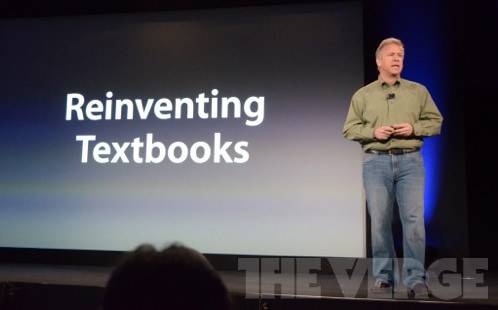Apple revolutionizes stuff. It’s practically conventional wisdom in the tech world that, even if they’re not first in the game or necessarily even the best, the Cupertino-based giant has a tendency to make a noticeable impact. They didn’t invent the MP3 player, smartphone or tablet, but they sure have redefined all of those products. Even if this tendency is strong, it’s not necessarily always how things play out. For an example, look no further than the Apple TV.

Today, the company set their sights on textbooks, an industry Steve Jobs himself described as being “ripe for digital destruction.” True as that may be, is what Apple planning to do in the space really all that disruptive?
There’s no doubt that giving authors dead simple tools for publishing their own interactive e-books is a big deal. As Nieman Journalism Lab’s Joshua Benton so effectively outlined earlier this week, creating a “Garage Band for e-books” could do to book publishing what the advent of the blogging platform did for short-form self-publishing on the Web. And it’s also true that the immersive, interactive experience of learning from the kinds of digital textbooks Apple demoed today has far more potential than print ever did.
If the company’s efforts are going to help revolutionize textbooks and education, it’s going to be some time before that happens, and they’re not going to do it alone.
Costly and Not Cross-Platform
Apple released the second version of its iBooks app for iOS today, which includes access to the new textbook titles. One thing the company did not announce is that the app is coming to other platforms. Granted, the iPad is still the leader of the tablet market, but Android is slowly catching up and Amazon just released a device geared toward content consumption that costs less than half of the entry level iPad. And it’s growing fast.

Of course, Apple ultimately wants to sell more of its hardware, but if it really wants its textbook initiative to truly take off, it will have to develop apps for other platforms, just as Amazon has done with its Kindle apps.
Another barrier to widespread adoption of this model is the cost of the iPad. It starts at $500, which is not something every American family can afford, especially with an economy in flux. With hundreds of “pages” of content, 3D interactive graphics, embedded video and other bells and whistles, we have to imagine these books aren’t particularly light on file size. As the books accumulate over time, alongside other content stored on the iPad, the 16 GB entry level model may no longer cut it, making it an even more expensive investment.
Not Aimed at the College Market (and Did We Mention the iPad is Expensive?)
The cost issue might be mitigated somewhat if the initiative were not targeted exclusively at high school students.

At least for the time being, Apple’s digital textbooks are targeted primarily at high school students. That fact alone presents a few roadblocks to the initiative being truly disruptive. For one, not every high school student in the United States can afford a $500 tablet device. Apple may well end up dropping the price when they launch the iPad 3 in a few weeks, but even then we’re probably still talking about a several-hundred-dollar gadget. Many middle and upper class families can afford that, but kids in inner city schools and other low-income areas, some of which can barely afford enough paper textbooks, aren’t going to be learning from iPads anytime soon.
For college students, investing in an iPad or similar device to replace textbooks makes simple economic sense. A single semester’s worth of textbooks can easily approach the cost of an iPad. If the e-books available on the device are drastically less expensive than their paper counterparts, it would be foolish not to make the digital switch. Of course, how dramatically prices would drop remains to be seen.
Apple is Partnering With Big Publishers, Not Killing Them
College textbooks are enormously, obscenely profitable for the the companies that print them. In fact, they’ve come up with all kinds of creative ways of milking more money out of students. Textbooks about ancient history will be revised and re-issued every other semester and the company will package supplementary CD-ROM’s and other digital learning materials, using them as a justification to jack up the price.
To get its new initiative off the ground, Apple is partnering with major publishers like McGraw Hill, Pearson and Houghton Mifflin Harcourt. For the high school market, perhaps those companies can afford to agree to a $15-per-book price tag. But when it comes to higher education, publishers are unlikely to allow a $180 biology print textbook be replaced with a $15 e-book. That would cut into their profits pretty dramatically. At the same time, interactive e-textbooks can’t be resold once they’re used, so perhaps the publishers can be convinced that their e-book revenues will be replenished on a semesterly basis without fail.
Interestingly, at the same time that Apple has unveiled major partnerships with textbooks publishers, it also unleashed what appears to be a powerful, easy-to-use publishing toolkit for producing those books. If independent authors manage to create enough competition, it’s possible that bigger publishers will have no choice but to play ball with Apple’s preferred pricing for textbooks.
Apple’s Not the Only Player
There’s little reason to doubt that a decade from now, the classroom and the tools in it will look very different from what students are accustomed to today. The textbook is indeed one of the educational tools that is most in need of a digital makeover. When paper textbooks are finally a thing of the past, it won’t have been Apple’s efforts alone that got us there.

For one, education is already being blown wide open by the Web. The mere concepts of “the lecture” and “the textbook” begin to look antiquated in light of things like Khan Academy, Wikipedia, Wolfram Alpha, iTunes U and MIT’s Open Courseware.
Those examples are just the tip of the iceberg. You’d be hard-pressed to find a student in the U.S. today that isn’t already using the Internet to supplement their educational experience to some extent. Apple is well aware of the changes that are already underway. That’s why they’re doing this. That’s why their DIY publishing tools include the ability pull in pieces of the Web and incorporate HTML5 and JavaScript.
Apple is also not the first company to try to re-imagine the textbook for a digital world. The so-called “smartbooks” offered by e-textbook startup Inking are in some ways more advanced than what Apple is bringing to the table. Other companies already active in this space include Chegg and Kno, as Audrey Watters points out on Hack Education.
Indeed, Apple is anything but the first entrant into this space. Not that that’s stopped them in the past.
Lead textbook photo by Stephen Cummings. Phil Schiller photo courtesy of The Verge.










